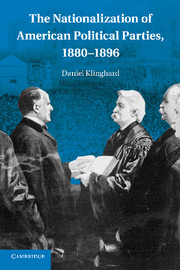Book contents
- Frontmatter
- Contents
- Preface
- Acknowledgments
- Introduction
- 1 Localism and the Jacksonian Mode
- 2 The Nineteenth-Century Associational Explosion and the Challenge to the Jacksonian Mode
- 3 Organizational Transformation and the National Parties
- 4 National Campaign Clubs and the Party-in-the-Electorate
- 5 Grover Cleveland and the Emergence of Presidential Party Leadership
- 6 Party Transformation in the Republican Party
- Conclusion
- Selected Bibliography
- Index
- References
Introduction
Published online by Cambridge University Press: 06 July 2010
- Frontmatter
- Contents
- Preface
- Acknowledgments
- Introduction
- 1 Localism and the Jacksonian Mode
- 2 The Nineteenth-Century Associational Explosion and the Challenge to the Jacksonian Mode
- 3 Organizational Transformation and the National Parties
- 4 National Campaign Clubs and the Party-in-the-Electorate
- 5 Grover Cleveland and the Emergence of Presidential Party Leadership
- 6 Party Transformation in the Republican Party
- Conclusion
- Selected Bibliography
- Index
- References
Summary
Between 1880 and 1896, national party leaders in both major American parties discarded the basic organizational preferences that had guided them since the formulation of the Jacksonian party organization in the 1830s and 1840s, and adopted new ones that informed the parties' development throughout the twentieth century. The purpose of this book is to bring this late-nineteenth-century transformation back into scholars' understanding of the development of American parties. These changes were legitimated by a new idea of party that was as portentous as that of the late 1790s described by Richard Hofstadter as the rise of “the idea of a party system.”
Rejecting the traditional understanding of the national party organizations as a congeries of independent, local organizations, national party leaders reconfigured the conduct of national campaigns to reach voters directly with nationally printed material and with direct presidential campaigning. Contrary to the traditional parties' insistence on local control of campaigns, they centralized control of presidential campaigns in the national committees, which became more capable than ever before of transposing national politics into national electoral mandates. Combating the traditional insistence on restraining the independence of the national committees, they empowered them to raise money independently of state party organizations, expanding the national organizations' ability to fund their own operations. They broke through the traditional geographic boundaries of party regularity to found party clubs designed to nationalize the party-in-the-electorate.
- Type
- Chapter
- Information
- Publisher: Cambridge University PressPrint publication year: 2010



